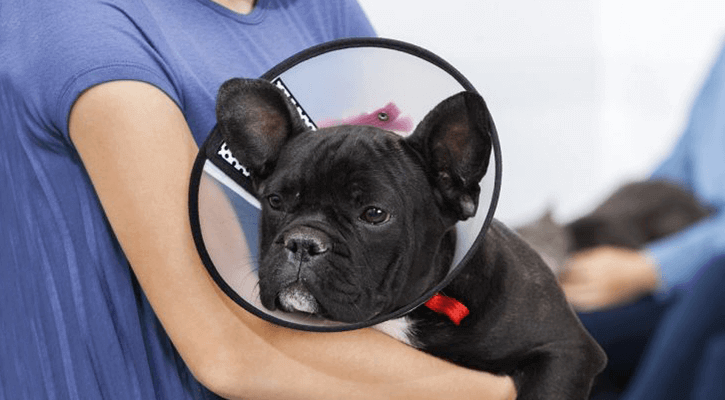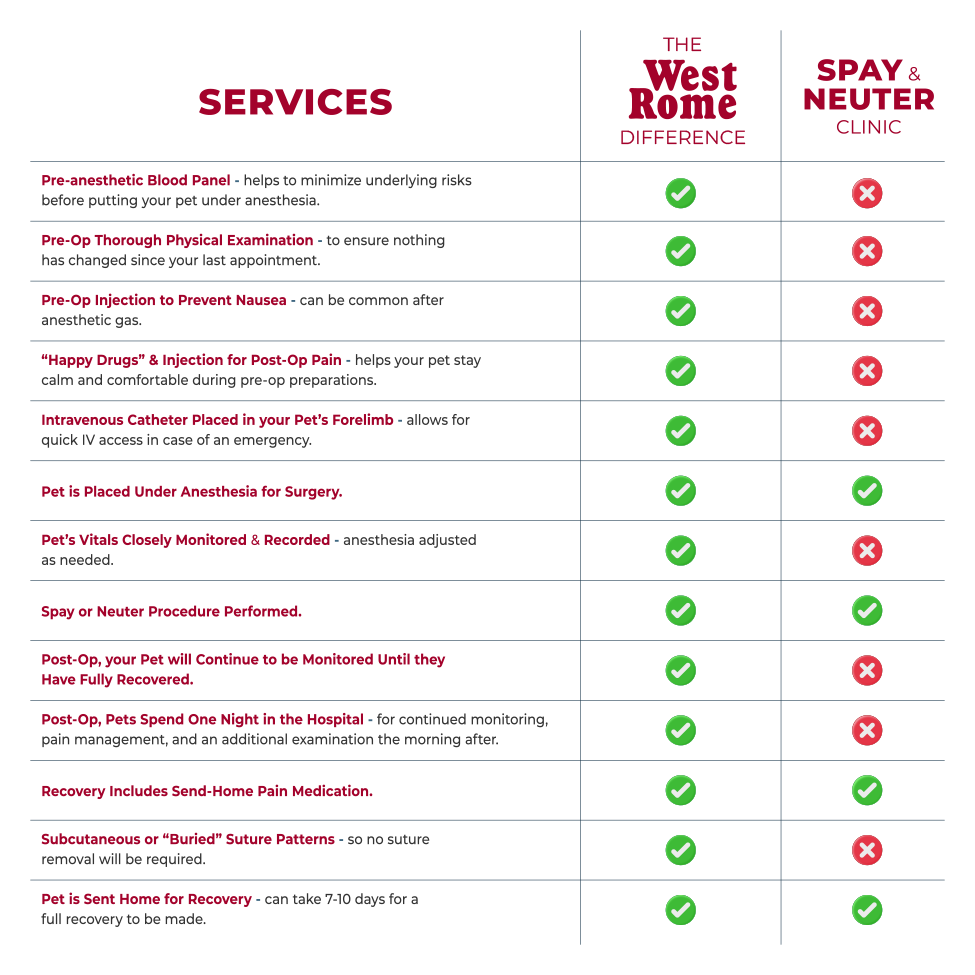
Spay & Neuter
Every year thousands of stray and unwanted animals are euthanized in shelters across the United States. Many of these deaths are the avoidable result of owners failing to spay and neuter their pets. Even if you keep a close watch on your pet, accidents happen, and unexpected offspring means more animals that won’t be given the chance at full, happy lives.
Spaying and neutering your cat or dog can help end this cycle, and both procedures have health benefits for your pet.
Why Choose West Rome Animal Clinic?
When it comes to spaying or neutering your pet, it’s important to choose the option that makes the most sense for you. While a discounted spay and neuter clinic may seem like a great way to save money, it often comes at the expense of quality care for your pet. West Rome Animal Clinic offers comprehensive medical care, including pre-operative exams, blood work, and anesthesia monitoring, which are essential for ensuring a safe and successful surgery. Additionally, our hospital has access to advanced medical equipment and a team of trained professionals, which allows for better care and faster recovery times. Below is a chart to quickly compare the above and beyond service you will receive at West Rome Animal Clinic.

Spaying Overview
Spaying is a common surgical procedure performed on female cats and dogs. The process is called an ovariohysterectomy and involves removing the patient’s uterus, ovaries, and fallopian tubes, rendering the animal incapable of reproduction. West Rome Animal Clinic veterinarians recommend spaying your pet at 4-6 months, depending on your dog’s breed and ideally before the patient’s first heat cycle. The health benefits of spaying your pet include eliminating the risk of ovarian and uterine tumors and infections as well as dramatically reducing the occurrence of mammary cancer later in life.
What To Expect Before And During A Spay Procedure At Our Hospital
Prior to any procedure, our team recommends sending off a pre-anesthetic blood panel. We recommend doing this a few days prior to surgery so we can ensure results are received before surgery day. This is to help minimize underlying risks before putting your pet under anesthesia. Even at a young age, there could be congenital problems that may put your pet at an increased risk. This panel will show us important values related to kidney and liver function – the organs that filter anesthesia out of the body – as well as reveal any blood clotting issues, which is important to know before a surgical procedure.
Upon intake, your pet will receive a thorough physical examination and an injection to prevent nausea, which can be common after anesthetic gas. Your pet will then receive their “happy drugs” as well as an injection for post-operative pain. The “happy drugs” have both an analgesic and a sedative effect. This way, your pet can be calm and comfortable during pre-operative preparations. An intravenous catheter will be placed in your pet’s forelimb to allow for quick IV access in the event of an emergency and for perioperative fluids. When it is time to perform the procedure, your pet will be induced with a sedative to allow access to the airway where an endotracheal tube will be secured for the passage of anesthetic gas and oxygen throughout the procedure. During the entire operation, your pet’s vitals will be closely monitored, recorded, and anesthesia adjusted as needed. Once complete, your pet will continue to be monitored until they have fully recovered. One of our veterinary nurses will contact you with an update on your pet’s condition. Our post-operative, spayed patients will go home the same day.
Recovery After Spaying Your Dog or Cat
Spaying, although common, is a major abdominal surgery requiring 7-10 days of recovery time. Recovery will include send-home pain medication and decreased activity can be common for the first couple of days following the procedure. Our veterinarians use subcutaneous or “buried” suture patterns so no suture removal will be required.
Neutering
Neutering is performed on male cats and dogs. This process castrates the animal, removing their testicles and making them unable to impregnate females. Neutering your cat or dog is advised when your pet is 4-6 months old but can be performed on older animals as well. The health benefits of neutering your pet include reducing aggressive behavior and decreasing dominant tendencies, reduces roaming and territory marking behavior, and eliminates the risk of testicular and prostate tumors.
What To Expect Before And During A Neuter Procedure At Our Hospital
Prior to any procedure, our team recommends sending off a pre-anesthetic blood panel. We recommend doing this a few days prior to surgery so we can ensure results are received before surgery day. This is to help minimize underlying risks before putting your pet under anesthesia. Even at a young age, there could be congenital problems that may put your pet at an increased risk. This panel will show us important values related to kidney and liver function – the organs that filter anesthesia out of the body – as well as reveal any blood clotting issues, which is important to know before a surgical procedure.
Upon intake, your pet will receive a thorough physical examination and an injection to prevent nausea, which can be common after anesthetic gas. Your pet will then receive their “happy drugs” as well as an injection for post-operative pain. The “happy drugs” have both an analgesic and a sedative effect. This way, your pet can be calm and comfortable during pre-operative preparations. An intravenous catheter will be placed in your pet’s forelimb to allow for quick IV access in the event of an emergency and for perioperative fluids. When it is time to perform the procedure, your pet will be induced with a sedative to allow access to the airway where an endotracheal tube will be secured for the passage of anesthetic gas and oxygen throughout the procedure. During the entire operation, your pet’s vitals will be closely monitored, recorded, and anesthesia adjusted as needed.
Recovery After Neutering Your Dog or Cat
Once complete, your pet will continue to be monitored until they have fully recovered. One of our veterinary nurses will contact you with an update on your pet’s condition. Our post-operative, neutered patients will go home the same day. Schedule Dog & Cat Spaying & Neutering in West Rome, GA
To learn more about spaying and neutering, or to get your cat or dog spayed or neutered, contact us at (706) 235-8861, schedule an appointment online, or download our mobile app on The App Store or Google Play!
